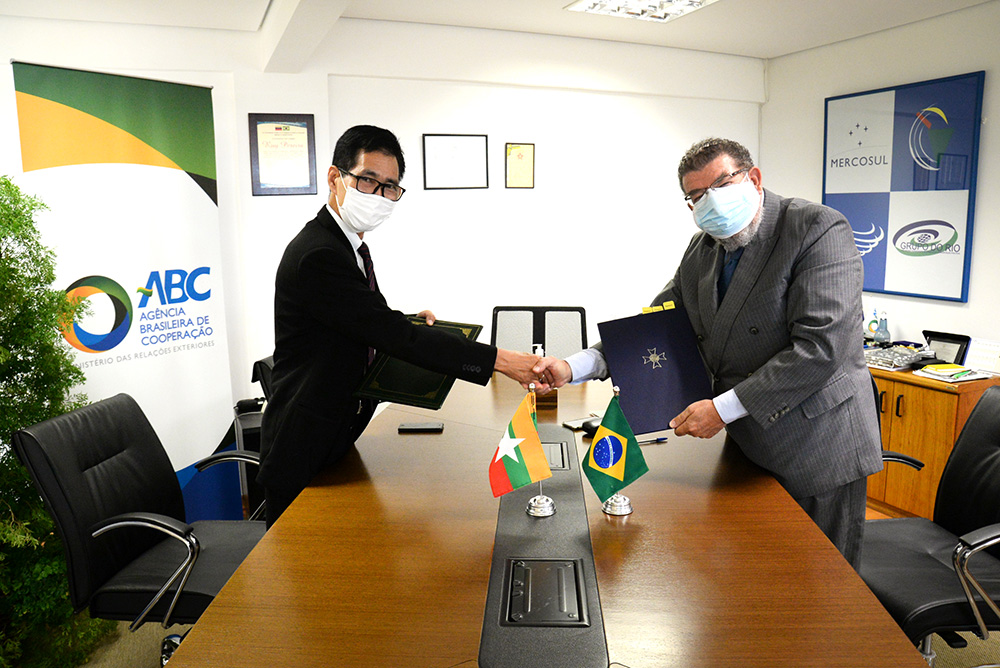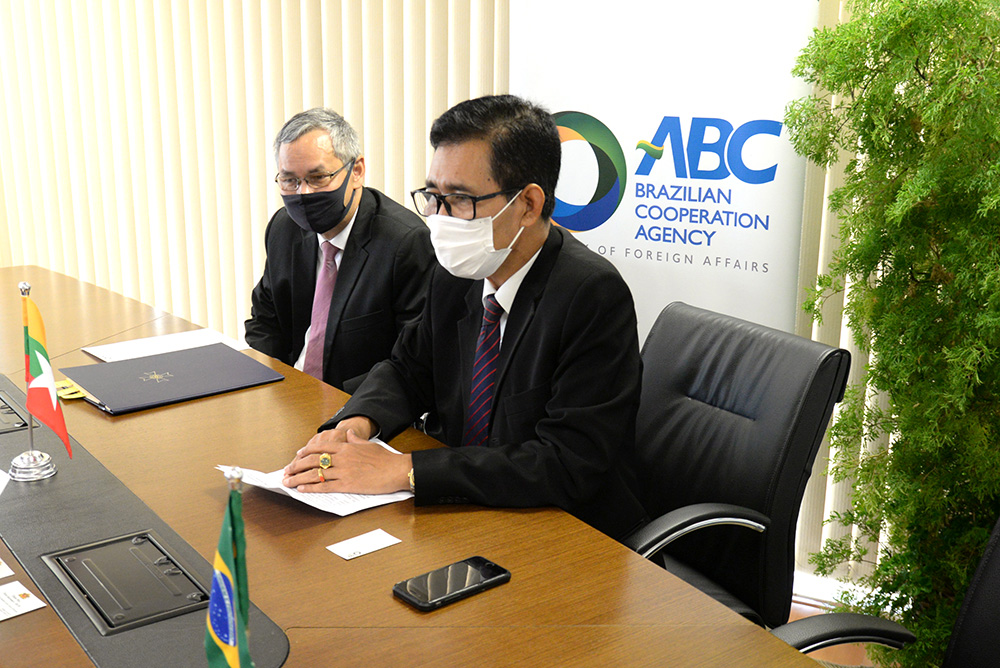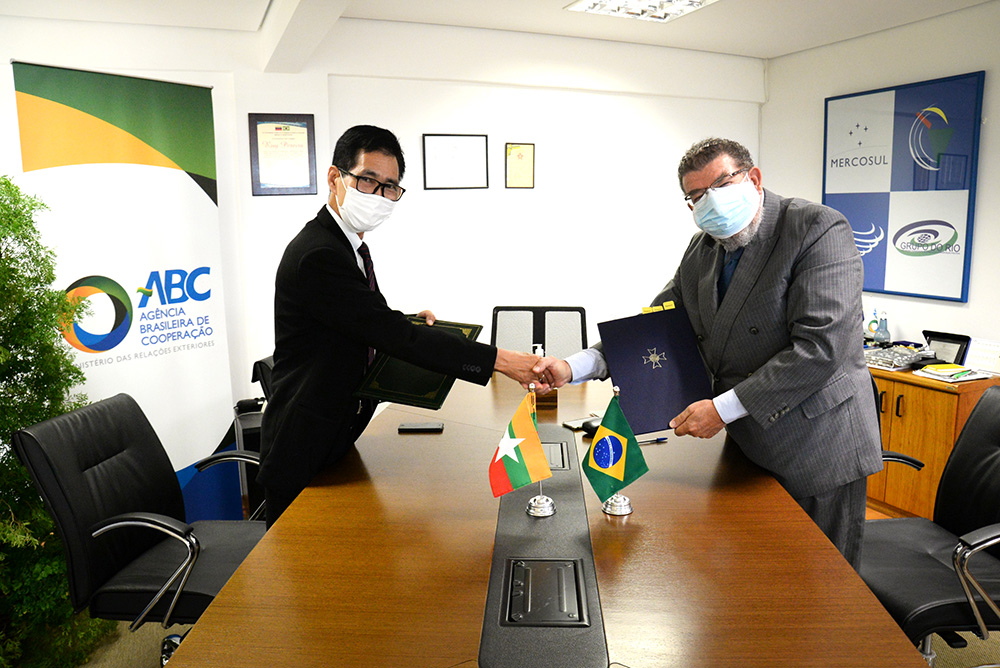Notícias
Brazil and Myanmar break new ground in technical cooperation to improve production of antivenom serum
 The Complementary Agreement to the Technical Cooperation Agreement between Brazil and the Government of the Republic of the Union of Myanmar for the implementation of the project "Improving methodologies and techniques for the production of antivenom serum in Myanmar - phase II: antivenom quality" was signed on March 28th. The signature was done by the Director of the Brazilian Cooperation Agency (ABC), Ambassador Ruy Pereira, and by the Myanmar Ambassador to Brazil, Mr. Myo Tint. The complementary adjustment is the document that grants international legal enforceability to the commitments and obligations of the two countries for the execution of the bilateral technical cooperation project.
The Complementary Agreement to the Technical Cooperation Agreement between Brazil and the Government of the Republic of the Union of Myanmar for the implementation of the project "Improving methodologies and techniques for the production of antivenom serum in Myanmar - phase II: antivenom quality" was signed on March 28th. The signature was done by the Director of the Brazilian Cooperation Agency (ABC), Ambassador Ruy Pereira, and by the Myanmar Ambassador to Brazil, Mr. Myo Tint. The complementary adjustment is the document that grants international legal enforceability to the commitments and obligations of the two countries for the execution of the bilateral technical cooperation project.
The goal of the project, which will last two years, is to increase the quality and performance of the antivenom serum produced in that Asian country. The initiative focuses on the standardization of production processes of the venom used in the preparation of the antivenom serum, as well as on the expansion of the control processes for antivenoms, antiophidic antigens and plasmas, aiming to increase production volume and improve the quality of antivenoms, and therefore meet the needs of the local population.
This is the second phase of the project that began in 2014. In this phase, the expansion of product quality will be contemplated, including immunization schemes and plasma collection. After its completion, it is expected that they will be in compliance with the current World Health Organization (WHO) guidelines for this type of health product.
 Accidents
Accidents
Myanmar has reportedly more than 13,000 cases of ophidic accidents per year, with the official mortality rate being around 600 deaths per year, mainly among young adults living in rural areas, due in particular to the long delay between the accident and the administration of antivenom, because of the long distances to the emergency services. Ophidic accidents represent a relevant public health problem in the world.
Ambassador Ruy Pereira expressed his wish that the partnership will strengthen the relations between Myanmar and Brazil as a way to contribute to the reduction of public health system overburden and also to reduce the deaths caused by ophidic accidents, especially in the rural population of that country.
The Brazilian cooperating institution in this initiative is the Butantan Institute. The Brazilian diplomat recalled, in his speech, that Butantan is the main producer of immunobiologicals in Brazil, responsible for a large percentage of the production of hyperimmune serum and a large volume of the national production of vaccine antigens, which are part of the vaccines used in the PNI (National Immunization Program), of the Ministry of Health. "All this experience of the Butantan Institute will be made available to the Government of Myanmar to help reduce deaths caused by the ophidian accident," said the director of the ABC.

The Ambassador of Myanmar, Mr. Myo Tint, said that the signing of this agreement is a milestone in the collaboration between the countries and that he hopes that other agreements will be signed in the future between the two nations: "We appreciate all the efforts of the Brazilian Cooperation Agency, from Itamaraty, since phase 1 of the project, initiated between the ABC, Butantan and the Ministries of Industry and Health of Myanmar," he said. "The capacity building program involved many exchanges between Butantan and the country's health and research institutions through trainings, visits, and seminars."
The first phase of the project, which started in 2014, aimed to improve the quality of serum production by training Myanmarese experts in related techniques and methodologies. The project included 3 training missions and 1 evaluation mission, and was closed in 2016, with the antivenom production capacity (more than 100,000 vials/year) achieved and in a sufficient manner to serve the local population.
The positive results of this first phase were also due to the Myanmar government's investment in the antivenom serum factory.
The Myanmarese experts pointed out that the methodologies learned in Brazil were of vital importance in the decision to purchase the equipment for the new plant. The Brazilian cooperation in veterinary management for extracting plasmas, widely replicated in Myanmar, and the improved infrastructure of the snake vivarium contributed significantly to increase productivity in terms of the number of ampoules produced and to reduce the costs with serum production.


